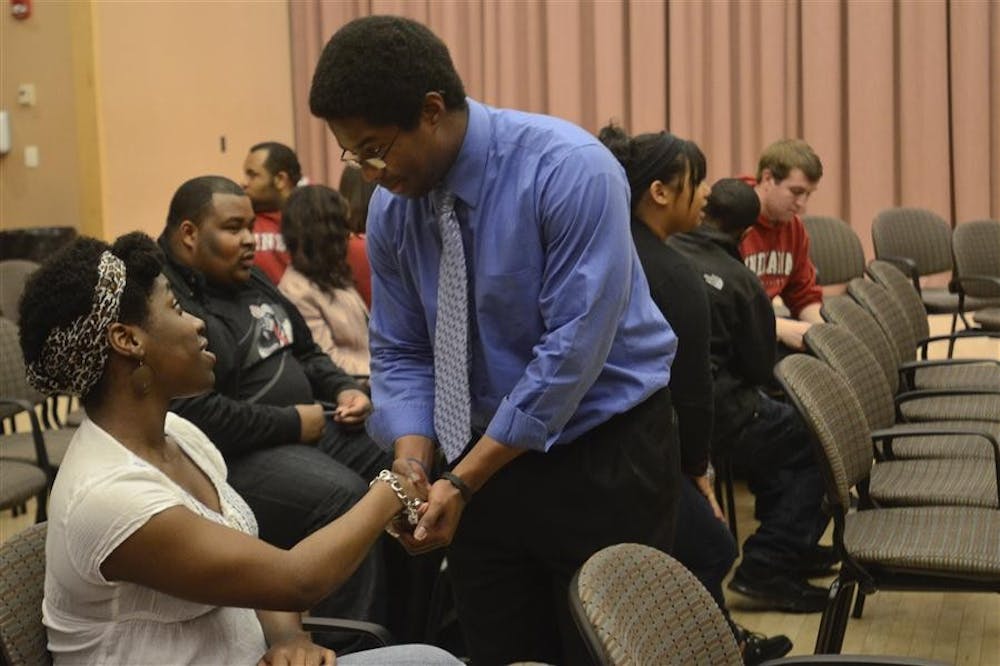The IU Black Student Union was host to “The State of the Black Student Union Address” at the Neal-Marshall Black Culture Center on Wednesday. The address featured five panelists discussing the positives and negatives facing the black community today.
“Why don’t you meet someone you’ve never met before?” Eric Love, director of the
Office of Diversity Education, asked of the audience at the start of the event.
A moment of trepidation passed before the small personable audience was up shaking hands, exchanging names and chatting. Friendly greetings passed between students and faculty who were present at the event.
Vanessa Gee, president of the BSU, opened with a discussion of the student group’s history. Gee said the BSU was a local organization that sat in at a variety of conventions and meetings in the 1960s, including the Little 500 and faculty board meetings, to promote racial integration and support of the black community.
She then discussed the different aspects currently facing the black community. “There is a lot of division between us,” Gee said.
This notion was supported by all five of the panel speakers.
Aaron Barnes, a senior in business marketing, explained that a “vocal few desire unity and cohesion, others seek to stay in their own social circles.”
He said this wasn’t different in the past.
“You can’t force people to change,” he said, reiterating some people simply prefer to keep to their smaller groups or “cliques” than become involved in the larger black community.
Barnes, whose main topic of discussion was the academic and social spheres of the black community, was quick to point out the gradually increasing graduation rate of black students at IU, with 51 percent at the rate’s peak. However, he said this number was lower than where it should have been.
“Look to your left. Look to your right,” Barnes said. “That person may not be here (come graduation).”
Christina Robinson, the second speaker of the panel, also focused on academics in her speech. A member of the Hudson and Holland Scholars program, she touted the organization’s great opportunities and resources for minority students on campus.
“We represent many schools on campus: Jacob, Kelly, HPER,” she said.
However, the Hudson and Holland Scholar program suffers from its own issues.
“We don’t have enough funding,” Robinson said. “If we had more support, our graduation rate would be higher, as it is lower than it was in the past. Hudson and Holland made me the well-rounded student I am today.”
Well-roundedness and involvement as well as community cohesion remained a large topic throughout the discussion.
“Blacks have performed lower academically than the rest of the population,” said BJ Grimes, another panel speaker. He also said he was concerned with the state of unity in the black community, and members of the black community were very supportive of each other but often only in their little “cliques.” He urged the audience to fight this impulse.
“We’re here for our education, here to better ourselves, here to better our community,” Grimes said.
Resources for black students certainly do exist, said Melody Barham, the third speaker of the panel.
Barham discussed the necessity of students using these resources, particularly the Neal-Marshall Center itself. The Neal-Marshall Center seeks to remain true to the original mission of the center, originally called “The Black House,” and provide a hub of black culture on IU’s campus.
She listed upcoming event after event, but then reminded the audience that students don’t often take advantage of what is offered to them.
“Often students complain that the Center doesn’t have anything to offer, but then no students show to the programs,” Barham said. “We want to support the Black Culture Center, but we need you to use the space.”
JT Snipes, a graduate student, concluded the panel discussion by calling on the black community to stand up and take their place on campus.
“All I want to say to you is wake up and take what you deserve,” Snipes said.
State of the Black Student Union address encourages communication

Get stories like this in your inbox
Subscribe





